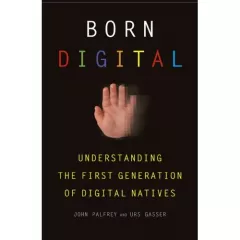Berkman Buzz: Week of August 25, 2008
BERKMAN BUZZ: A look at the past week's online Berkman conversations. If you'd like to receive this by email, just sign up here. The Berkman Center for Internet & Society at Harvard University
* * * * * * * * * * * * * * * * * * * * * * * * * * * * * * * * *
*John Palfrey and Urs Gasser's Born Digital hits book shelves
*Ethan Zuckerman evaluates citizen journalism during the Georgian war
*Sam Bayard tells about a dog track owner whose bark is as bad as his bite, when it comes to chilling speech
*Bruce Etling looks at bloggers at the Democratic National Convention
*David Weinberger discusses a word processor fail
*Digital Natives Reporters in the Field: "Studying Online (Part II)"
Weekly Global Voices: "Saudi Arabia: Independent women"
* * * * * * * * * * * * * * * * * * * * * * * * * * * * * * * * *
"I am pleased to announce that John Palfrey and Urs Gasser's Born Digital: Understanding the First Generation of Digital Natives is out in the wild! This book grows out of the digital natives project at the Berkman Center (with which I am loosely affiliated). "Born Digital" investigates what it means to grow up in a mediated culture and the ways in which technology inflects issues like privacy, safety, intellectual property, media creation, and learning..."
From danah boyd's blogpost, "'Born Digital' by John Palfrey and Urs Gasser"
"As Russia slowly pulls out of Georgia and the world of foreign policy wonks contemplates how the Olympics War will change the geopolitical map of the Caucuses, the world of citizen media is busily evaluating its (our?) own performance. Two good friends have taken the blogosphere to task for its failures during the conflict. Rather than rise to the defense of Georgian, Russian, Ossetian and global bloggers, I wanted to take a look at their critiques and at the phenomenon of citizen media during the conflict and at the emergence of one of the interesting epiphenomena of citizen media: citizen propaganda..."
From Ethan Zuckerman's blogpost, "Blogger 'failures' in the Georgian war, and the rise of citizen propaganda"
"The Arizona Star reports that the Tucson Greyhound Park has dropped its defamation lawsuit against blogger Karyn Zoldan of the End Tucson Greyhound Racing website and blog. Both parties agreed to dismissal of the suit, but Zoldan did not pay anything in return for the settlement. She did, however, make some minor changes to statements on the website, which apparently satisfied John Munger, the lawyer who represented the track in the lawsuit..."
From Sam Bayard's blogpost, "Dog Track Drops Lawsuit, Leaving Blogger Relieved But Rattled"
"I had to chuckle at David Carr’s article about bloggers “lurking around every turn” at the Democratic convention. In a somewhat annoyed tone he writes: 'Each time there was a reporting stop — at a small McCain counterdemonstration, a Hillary counterdemonstration, or in the bloggers’ tent — the people formerly known as the audience refused to behave like one. They brandished video cams, iPhones and recorders, doing their own documentation of what was under way...'"
From Bruce Etling's blogpost, "Journalists at Convention Still Don’t Know What to Make of Bloggers"
"Typewriters were terrible tools for writing drafts if only because they had no facility for crossing sections out. At least with a pen, you could make a quick line through an entire paragraph that failed. Word processors still act as if we know what we’re writing. Oh, they’re obviously much better than typewriters, for which I have zero nostalgia. ('Ah, remember the month I spent locked in my room, typing the final draft of my dissertation? Sweet!') Word processors let you swiftly delete failed paragraphs, let you undo mistakes and re-do mistaken mistakes, and awkwardly track revisions. But they’re not designed for writing when you’re unsure of what you’re writing..."
From David Weinberger's blogpost, "A word processor I want"
"Last week we introduced you to David Kosslyn, who is starting up a website, StudyBuddy, in the hopes of bringing together digital natives online to study together. There David talked about his hopes and aims regarding the project. In this week’s video, produced by Kanupriya Tewari, we are going to look at the implications of StudyBuddy; from cyber-bullying to the loss of face-to-face interaction..."
From the Digital Natives Project blogpost, "Studying Online (Part II)"
"While there are no doubt restrictions for women living in Saudi Arabia, they do not necessarily match the oppressive image that many foreigners have of the country. In this post we have advice for women wanting to visit Jeddah alone, a review of a women-only hotel in Riyadh, and a plea to those foreigners who feel they want to speak on behalf of oppressed Saudi women. We start with Hala, currently living in the US and blogging at HALA_IN_USA, who is giving advice to a single female friend visiting Jeddah for the first time...'"
From Ayesha Saldanha's blogpost for Global Voices, "Saudi Arabia: Independent women"
